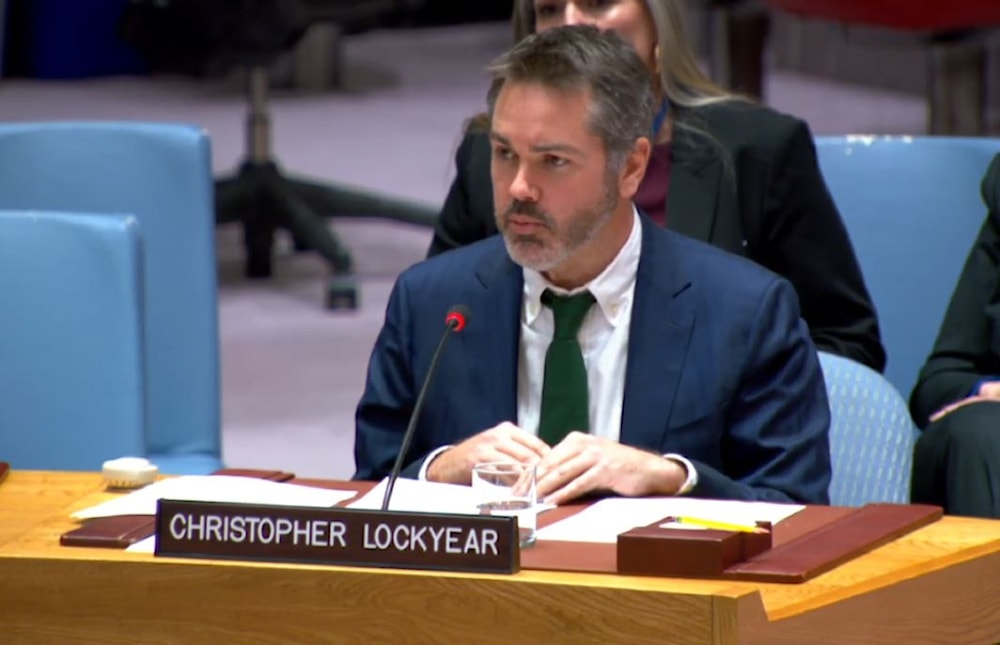Head of MSF 'appalled' by US vetoes of Gaza ceasefire UN resolutions
The head of MSF criticizes the UN Security Council for its failure to put an end to the massacre in Gaza, stating "we have watched members of this council deliberate and delay while civilians died."
-

MSF Secretary General Christopher Lockyear is pictured at the UN Security Council on Feb. 22, 2024. (Screengrab)
Secretary General of Doctors Without Borders (MSF), Christopher Lockyear, expressed his "appalling" sentiment towards the US for its repeated vetoes on resolutions for a ceasefire in Gaza during his address to the UN Security Council on Thursday.
"Meeting after meeting, resolution after resolution. This body has failed to effectively address this conflict," Secretary General Christopher Lockyear told the Council. "We have watched members of this council deliberate and delay while civilians died."
After its most recent veto this week, the US circulated an alternative Gaza resolution that, for the first time, mentions the word "ceasefire." However, there were no immediate calls for its implementation.
The resolution reportedly supports "a temporary ceasefire in Gaza", aiming to prevent further harm to civilians and their displacement, particularly in Rafah.
If further "determines that under current circumstances a major ground offensive into Rafah would result in further harm to civilians and their further displacement including potentially into neighboring countries."
It also claims that Israeli plans to invade Rafah "would have serious implications for regional peace and security, and therefore underscores that such a major ground offensive should not proceed under current circumstances."
@MSF secretary general Chris Lockyear today talking about the Illusion of aid in Gaza, the mass suffering and risk, and the complicity of the USA. pic.twitter.com/ppFKmwYPug
— Tammam Aloudat تمّام العودات (@Tammamo) February 22, 2024
Commenting on the move, Lockyear labeled the US' action as "misleading at best," adding that his organization was "appalled by the willingness of the US to use its powers as a permanent Council member to obstruct efforts to adopt the most evident of resolutions. One demanding an immediate and sustained ceasefire."
"This Council should reject any resolution that further hampers humanitarian efforts on the ground and leads this Council to tacitly endorse the continued violence and mass atrocities in Gaza," he continued. "The people of Gaza need a ceasefire, not when practicable, but now. They need a sustained ceasefire, not a temporary period of calm. Anything short of this is gross negligence."
Read more: In 139 days only: 29,410 killed, 69,465 injured in Gaza
The US has so far exercised its veto power four times to block a ceasefire in Gaza.
The first time was on October 18, 2023, with a Brazil-drafted resolution, the second was on December 8, 2023, with a UAE-drafted resolution, and the third was on December 22, 2023, with a Russian-drafted resolution.
The most recent veto was exercised on Tuesday, regarding an Algerian-drafted resolution, sparking significant controversy.
Russian Deputy Foreign Minister Mikhail Bogdanov labelled the US veto of Algeria's UN resolution as a license for the ongoing massacre against innocent civilians in Gaza.
The Syrian Ministry of Foreign Affairs likewise condemned the use of the US' veto, noting that the event marks another stain on the history of the UNSC.
NGOs agree Israeli aggression impeding delivery of aid to Gaza
At a press briefing by Doctors Without Borders (MSF), Refugees International, Oxfam, Amnesty International, and other groups on Tuesday, Jeremy Konyndyk, president of Refugees International, stated that due to Israeli strikes, it has become "virtually impossible" for humanitarian organizations to operate safely within Gaza, thereby increasing the risk of famine.
"People, mostly at this point in the north, are already right on the brink of famine," Konyndyk said. "The risk here, if there is not a meaningful humanitarian operation allowed to operate in an unfettered way at scale throughout Gaza, is famine."
"And that famine will occur not because of any natural phenomenon but simply because of the manner in which this war is being conducted and the persistent and intentional denials of humanitarian access principally by the Israeli government."
Konyndyk also highlighted that the idea of safely evacuating the population of Rafah is a "mirage," as there are no other safe destinations available for them.
Israeli forces fired on UN food convoy in Gaza
Documents shared exclusively by the UN and CNN's analysis revealed on Wednesday that Israeli occupation forces (IOF) opened fire on a United Nations convoy carrying vital humanitarian aid in central Gaza, eventually blocking the trucks' progress to the northern part, where Palestinians are on the verge of famine.
CNN has received correspondence between the UN and the IOF indicating that the convoy's path was agreed upon by both sides before the bombing. According to an internal incident report created by UNRWA, the major UN assistance agency in Gaza, and obtained by CNN, the vehicle was one of ten in a convoy that was stopped at an IDF holding position when it was fired on.
Most of the cargo, primarily wheat flour, which was required to produce bread, was destroyed.
Readm more: UN food agency cuts aid deliveries to northern Gaza

 5 Min Read
5 Min Read










